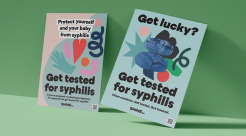SHINE SA Media Release : 28 November 2018 (Updated 17 July 2019)
As you may be aware, an outbreak of infectious syphilis affecting rural and remote Aboriginal communities in the Far North and Eyre and Western regions of South Australia has been ongoing since November 2016. The outbreak has now extended to include metropolitan Adelaide, and is part of a larger multi-jurisdictional outbreak affecting predominantly rural and remote Aboriginal and Torres Strait Islander communities across northern Australia.
A public health alert about the outbreak was released by Communicable Disease Control Branch on 14 November 2018 (see www.sahealth.sa.gov.au/healthalerts).
People infected with syphilis in pregnancy can transmit syphilis to their baby, which can result in perinatal death, premature delivery, and congenital abnormalities. Since the beginning of the outbreak in South Australia five cases of infectious syphilis have occurred in pregnancy, and one child has been born with congenital syphilis.
To prevent further cases of congenital syphilis, the Communicable Disease Control Branch has recommended increased syphilis testing during pregnancy for all high risk people. People at higher risk during pregnancy include:
- Aboriginal people who reside in, or have travelled through, an outbreak area; or
- Any person (regardless of cultural background) with an Aboriginal sexual partner, if either resides in, or has travelled through, an outbreak area.
In this high risk group, syphilis testing is recommended at:
- Initial antenatal visit (10-12 weeks);
- 28 weeks;
- 36 weeks;
At delivery;
- 6 weeks post-delivery (post-natal check).
The South Australian Perinatal Practice Guidelines were updated in June 2018 to reflect these recommendations. Testing and timely treatment of syphilis during pregnancy can reduce the incidence of congenital syphilis. We ask that you distribute this information to all clinical colleagues involved in the care of pregnant people who are at high risk of syphilis infection, to ensure staff are aware of these recommendations and to reduce the risk of further cases of congenital syphilis.
Click here to view the SA Health Fact Sheet for Health Professionals – Infectious syphilis outbreak.









